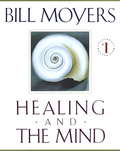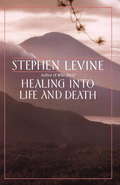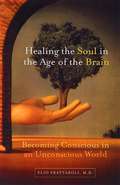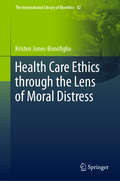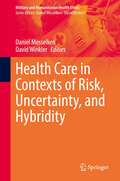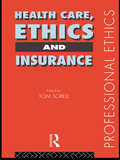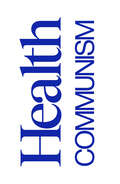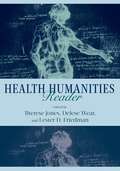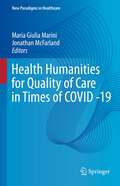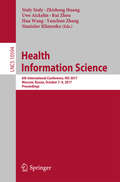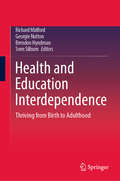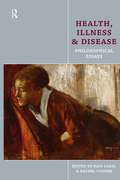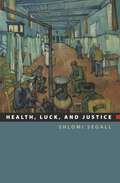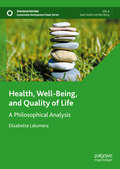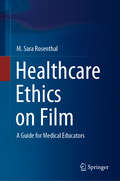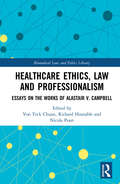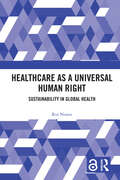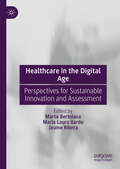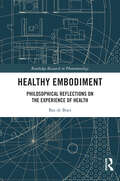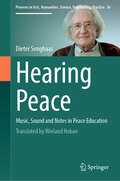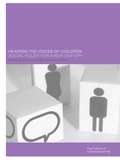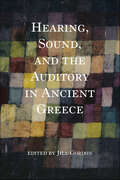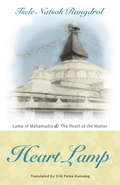- Table View
- List View
Healing and the Mind
by Bill MoyersAt last, the paperback edition of the monumental best-seller (almost half a million copies in print!) that has changed the way Americans think about sickness and health -- the companion volume to the landmark PBS series of the same name. In a remarkably short period of time, Bill Moyers's Healing And The Mind has become a touchstone, shaping the debate over alternative medical treatments and the role of the mind in illness and recovery in a way that few books have in recent memory. With almost half a million copies in print, it is already a classic -- the most widely read and influential book of its kind. In a series of fascinating interviews with world-renowned experts and laypeople alike, Bill Moyers explores the new mind/body medicine. Healing And The Mind shows how it is being practiced in the treatment of stress, chronic disease, and neonatal problems in several American hospitals; examines the chemical basis of emotions, and their potential for making us sick (and making us well); explores the fusion of traditional Chinese medicine with modern Western practices in contemporary China; and takes an up-close, personal look at alternative healing therapies, including a Massachusetts center that combines Eastern meditation and Western group therapy, and a California retreat for cancer patients who help each other even when a cure is impossible. Combining the incisive yet personal interview approach that made A World Of Ideas a feast for the mind and the provocative interplay of text and art that made The Power Of Myth a feast for the imagination, Healing And The Mind is a landmark work.
Healing into Life and Death
by Stephen LevineInHealing Into Life And Death, Stephen Levine deals directly with the choice and application of treatment, offering original techniques for working with pain and grief, and discusses the development of a merciful awareness as a means of healing, as well as how to encourage others to do the same.
Healing the Soul in the Age of the Brain: Becoming Conscious in an Unconscious World
by Elio FrattaroliIt is no exaggeration to say that psychiatry today is in imminent danger of losing its mind altogether," writes Elio Frattaroli, M. D. , in this landmark book. What he is talking about is a medical model of the brain that denies the very existence of anything like a soul -based on big science's delusionary hope that it is actually possible to fix the soul's sickness by taking a pill. Much as we might like one, Frattaroli argues, there is no quick fix for the soul; we yearn for something more than what Prozac can provide. Frattaroli writes with spirit, combining a Renaissance sensibility with an unshakable humanism that shows why tapping into the soul is the highest quest on which we can embark. His references hark back to Shakespeare, to Freud, to Descartes and Bohr; in drawing upon physics, philosophy, literature, and psychology, and by using riveting case histories from his own life and practice, Frattaroli illuminates some of the most complex intellectual discoveries of our time.
Health Care Ethics through the Lens of Moral Distress (The International Library of Bioethics #82)
by Kristen Jones-BonofiglioThis book provides a bridge between the theory to practice gap in contemporary health care ethics. It explores the messiness of everyday ethical issues and validates the potential impacts on health care professionals as wounded healers who regularly experience close proximity to suffering and pain. This book speaks to why ethics matters on a personal level and how moral distress experiences can be leveraged instead of hidden. The book offers contributions to both scholarship and the profession. Nurses, physicians, social workers, allied health care professionals, as well as academics and students will benefit from this book.
Health Care in Contexts of Risk, Uncertainty, and Hybridity (Military and Humanitarian Health Ethics)
by Daniel Messelken David WinklerThis book sheds light on various ethical challenges military and humanitarian health care personnel (HCP) face while working in adverse conditions. Contexts of armed conflict, hybrid wars or other forms of violence short of war, as well as natural disasters, all have in common that ordinary circumstances can no longer be taken for granted. Hence, the provision of health care has to adapt, for example, to a different level of risk, to scarce resources, or uncommon approaches due to external incentives or requirements. This affects the practice of health care as well as its ethics. This book offers a panoramic overview on various challenges healthcare faces in extraordinary situations and provides new insights from practitioners’ as well as from academic scholars’ perspectives.
Health Care, Ethics and Insurance (Professional Ethics)
by Tom SorellThis volume is an exploration of the ethical issues raised by health insurance, which is particularly timely in the light of recent advances in medical research and political economy. Focusing on a wide range of areas, such as AIDS, genetic engineering, screening and underwriting, new disability legislation and the ethics of private and public health insurance, this comprehensive and sometimes controversial book provides an essential survey of the key issues in health insurance. Divided into two parts, the first considers the ethics of underwriting, risk assessment and the acceptance and refusal of insurance risk by insurers. Discussing the unjust treatment of high-risk applicants, the authors identify sources of unfairness to both parties of the insurance contract, indicating how reasonable trade-offs can be made. The second part considers the argument for a mix of public and private insurance for acute and long-term care, offering recommendations for changes in the balance of social insurance, and discussing the shift toward long-term contracts in private health care and pension insurance.
Health Communism: A Surplus Manifesto
by Beatrice Adler-Bolton Artie VierkantA searing analysis of health and illness under capitalism from hosts of the hit podcast &“Death Panel&” In this fiery, theoretical tour-de-force, Beatrice Adler-Bolton and Artie Vierkant offer an overview of life and death under capitalism and argue for a new global left politics aimed at severing the ties between capital and one of its primary tools: health. Written by co-hosts of the hit &“Death Panel&” podcast and longtime disability justice and healthcare activists Adler-Bolton and Vierkant, Health Communism first examines how capital has instrumentalized health, disability, madness, and illness to create a class seen as &“surplus,&” regarded as a fiscal and social burden. Demarcating the healthy from the surplus, the worker from the &“unfit&” to work, the authors argue, serves not only to undermine solidarity but to mark whole populations for extraction by the industries that have emerged to manage and contain this &“surplus&” population. Health Communism then looks to the grave threat capital poses to global public health, and at the rare movements around the world that have successfully challenged the extractive economy of health. Ultimately, Adler-Bolton and Vierkant argue, we will not succeed in defeating capitalism until we sever health from capital. To do this will require a radical new politics of solidarity that centers the surplus, built on an understanding that we must not base the value of human life on one&’s willingness or ability to be productive within the current political economy. Capital, it turns out, only fears health.
Health Humanities Reader
by Mark Vonnegut Audrey Shafer Martha Stoddard Holmes Howard Brody Jeff Nisker Bradley Lewis Rosemarie Tong Ian Williams Sander L. Gilman Rafael Campo Daniel Goldberg Michael Rowe Thomas R. Cole Alice Dreger Joseph N. Straus Jonathan M. Metzl Arthur W. Frank E. Ann Kaplan Rebecca Hester John Lantos Shelley Wall Alan Bleakley Marjorie Levine-Clark Michael Sappol Mark Clark Professor Therese Jones Professor Delese Wear Professor Lester D. Friedman David H. Flood Rhonda L. Soricelli Lisa Keränen Martin F. Norden Professor Lisa I. Iezzoni Felicia Cohn Martha Montello Amy Haddad Rebecca Garden Jack Coulehan Professor Bernice Hausman Gretchen A. Case Allen Peterkin Susan M. Squier Sayantani DasGupta Maren Grainger-Monsen Benjamin Saxton Jerald Winakur Anne Hudson Jones Tod Chambers Raymond C. Barfield Lucy Selman Jeffrey P. Bishop Catherine Belling Paul Root Wolpe Professor Allison B. Kavey Julie M. Aultman Michael Blackie Erin Gentry Lamb Jay BaruchOver the past forty years, the health humanities, previously called the medical humanities, has emerged as one of the most exciting fields for interdisciplinary scholarship, advancing humanistic inquiry into bioethics, human rights, health care, and the uses of technology. It has also helped inspire medical practitioners to engage in deeper reflection about the human elements of their practice.In Health Humanities Reader, editors Therese Jones, Delese Wear, and Lester D. Friedman have assembled fifty-four leading scholars, educators, artists, and clinicians to survey the rich body of work that has already emerged from the field—and to imagine fresh approaches to the health humanities in these original essays. The collection’s contributors reflect the extraordinary diversity of the field, including scholars from the disciplines of disability studies, history, literature, nursing, religion, narrative medicine, philosophy, bioethics, medicine, and the social sciences. With warmth and humor, critical acumen and ethical insight, Health Humanities Reader truly humanizes the field of medicine. Its accessible language and broad scope offers something for everyone from the experienced medical professional to a reader interested in health and illness.
Health Humanities for Quality of Care in Times of COVID -19 (New Paradigms in Healthcare)
by Maria Giulia Marini Jonathan McFarlandThe Covid pandemic has led us into an upheaval that has made us question the certainties underlying what it means to be a human being in our age; the ability to control medical and social facts through evidence. For the first-time western and developed countries have had to confront what many populations from the developing world (Africa. Latin America, etc) face on a daily basis with HIV and Ebola, etc. The Interconnectedness of Globalization has been the real disseminating catalyst of COVID 19, and many scientists wonder if this virus is the result of the Anthropocene age, with its indisputable lack of respect for the natural ecosystems. The virus has demonstrated that our frailty is only skin deep, and it has not only brought death, despair, but it has broken our interdependency as human beings, by imposing self- isolation as well as creating new ways of connections so that safety cannot imply loneliness. In this book, the coping strategies that originate from the multiple languages of care such as narrative, literature, science, philosophy, art, digital science are shown not only as reflective tools to promote health but also wellbeing amongst carers, patients, students, and citizens of our planet Earth. These strategies should be supported by the decision makers since they are low-cost investments necessary to make the health care system work. They however require a change of cultural paradigm. This book is a useful toolkit for patients, citizens and care services physicians who want to learn more on how to live better with this new world.
Health Information Science: 6th International Conference, HIS 2017, Moscow, Russia, October 7-9, 2017, Proceedings (Lecture Notes in Computer Science #10594)
by Siuly Siuly, Zhisheng Huang, Uwe Aickelin, Rui Zhou, Hua Wang, Yanchun Zhang and Stanislav KlimenkoThis book constitutes the refereed proceedings of the 6th International Conference on Health Information Science, HIS 2017, held in Moscow, Russia, in October 2017.The 11 full papers and 7 short papers presented were carefully reviewed and selected from 44 submissions. The papers feature multidisciplinary research results in health information science and systems that support health information management and health service delivery. They relate to all aspects of the conference scope, such as medical/health/biomedicine information resources such as patient medical records, devices and equipments, software and tools to capture, store, retrieve, process, analyze, and optimize the use of information in the health domain; data management, data mining, and knowledge discovery, management of publichealth, examination of standards, privacy and security issues; computer visualization and artificial intelligence for computer aided diagnosis; development of new architectures and applications for health information systems.
Health and Education Interdependence: Thriving from Birth to Adulthood
by Brendon Hyndman Richard Midford Georgie Nutton Sven SilburnThis book explores the interdependence of health and education, and how optimising this important relationship provides the foundation for achieving improved life outcomes from birth into adulthood. Adopting a multi-disciplinary approach, it draws on bio-medical, epidemiological, educational, psychological and economic evidence to demonstrate the benefits of the reflexive, positive associations between good health and educational attainment over the life course. In this, it offers readers insights into the complex nature of the nexus between health and education and how this relationship influences development. Health and Education Interdependence: Thriving from Birth to Adulthood is essential reading for education and health researchers and policymakers, teachers and public health and health promotion practitioners, as well as students studying in these fields.
Health and Healthcare Policy in Italy since 1861: A Comparative Approach
by Francesco TaroniProviding a historical overview of healthcare in Italy from its unification in 1861 to the present COVID-19 pandemic, this book analyses the political, social and cultural impact of Italian healthcare policy and medicine. The author examines the development of public health, hospitals, and primary care, and the building of healthcare systems across three political regimes in Italy: the liberal period (1861-1914), Fascism (1922-43), and the Italian Republic (1948 to the present day). By emphasising the embeddedness of health-related legislation in Italy’s political and social background, this book offers a comparative account of Italian health policy, and contrasts this with developments in neighbouring European countries, Canada and the United States. The book focuses on the Italian government’s reaction to the social and political impact of several diseases: pellagra; cholera; malaria; and tuberculosis, and explores the present-day response to the current COVID-19 pandemic. A timely and comprehensive read, this book will appeal to those teaching and researching Italian history and the history of medicine and healthcare more widely.
Health, Illness and Disease: Philosophical Essays
by Rachel Cooper Havi CarelWhat counts as health or ill health? How do we deal with the fallibility of our own bodies? Should illness and disease be considered simply in biological terms, or should considerations of its emotional impact dictate our treatment of it? Our understanding of health and illness had become increasingly more complex in the modern world, as we are able to use medicine not only to fight disease but to control other aspects of our bodies, whether mood, blood pressure, or cholesterol. This collection of essays foregrounds the concepts of health and illness and patient experience within the philosophy of medicine, reflecting on the relationship between the ill person and society. Mental illness is considered alongside physical disease, and the important ramifications of society's differentiation between the two are brought to light. Health, Illness and Disease is a significant contribution to shaping the parameters of the evolving field of philosophy of medicine and will be of interest to medical practitioners and policy-makers as well as philosophers of science and ethicists.
Health, Luck, and Justice
by Shlomi Segall"Luck egalitarianism"--the idea that justice requires correcting disadvantages resulting from brute luck--has gained ground in recent years and is now the main rival to John Rawls's theory of distributive justice. Health, Luck, and Justice is the first attempt to systematically apply luck egalitarianism to the just distribution of health and health care. Challenging Rawlsian approaches to health policy, Shlomi Segall develops an account of just health that is sensitive to considerations of luck and personal responsibility, arguing that people's health and the health care they receive are just only when society works to neutralize the effects of bad luck. Combining philosophical analysis with a discussion of real-life public health issues, Health, Luck, and Justice addresses key questions: What is owed to patients who are in some way responsible for their own medical conditions? Could inequalities in health and life expectancy be just even when they are solely determined by the "natural lottery" of genes and other such factors? And is it just to allow political borders to affect the quality of health care and the distribution of health? Is it right, on the one hand, to break up national health care systems in multicultural societies? And, on the other hand, should our obligation to curb disparities in health extend beyond the nation-state? By focusing on the ways health is affected by the moral arbitrariness of luck, Health, Luck, and Justice provides an important new perspective on the ethics of national and international health policy.
Health, Wealth & Happiness: Has the Prosperity Gospel Overshadowed the Gospel of Christ?
by David Jones Russell WoodbridgeA timely exploration and discussion of the prosperity gospel movement.
Health, Well-Being, and Quality of Life: A Philosophical Analysis (Sustainable Development Goals Series)
by Elisabetta LalumeraThis book analyses and discusses from a philosophical perspective the concepts of health, well-being and quality of life in contemporary biomedical research. The guiding idea of the book is that different concepts of health, well-being, and quality of life lead to different types of projects, actions and policies, both at the individual and institutional level. For this reason, it is important to analyse them and make them clear, in their interweaving of objective dimensions (the facts) and evaluative dimensions (the values).
Healthcare Ethics on Film: A Guide for Medical Educators
by M. Sara RosenthalThis book is a companion to Clinical Ethics on Film and deals specifically with the myriad of healthcare ethics dilemmas. While Clinical Ethics on Film focuses on bedside ethics dilemmas that affect the healthcare provider-patient relationship, Healthcare Ethics on Film provides a wider lens on ethics dilemmas that interfere with healthcare delivery, such as healthcare access, discrimination, organizational ethics, or resource allocation. The book features detailed and comprehensive chapters on the Tuskegee Study, AIDS, medical assistance in dying, the U.S. healthcare system, reproductive justice, transplant ethics, pandemic ethics and more. Healthcare Ethics on Film is the perfect tool for remote or live teaching. It’s designed for medical educators and healthcare professionals teaching any aspect of bioethics, healthcare ethics or the health sciences, including medical humanities, history of medicine and health law. It is also useful to the crossover market of film buffs and other readers involved in healthcare or bioethics.
Healthcare Ethics, Law and Professionalism: Essays on the Works of Alastair V. Campbell (Biomedical Law and Ethics Library)
by Richard Huxtable Voo Teck Chuan Nicola PeartHealthcare Ethics, Law and Professionalism: Essays on the Works of Alastair V. Campbell features 15 original essays on bioethics, and healthcare ethics specifically. The volume is in honour of Professor Alastair V. Campbell, who was the founding editor of the internationally renowned Journal of Medical Ethics, and the founding director of three internationally leading centres in bioethics, in Otago, New Zealand, Bristol, UK, and Singapore. Campbell was trained in theology and philosophy and throughout his career worked with colleagues from various disciplines, including law and various branches of healthcare. The diversity of topics and depth of contributors’ insights reflect the breadth and impact of Campbell’s philosophical work and policy contributions to healthcare ethics. Throughout his long academic career, Campbell’s emphasis on healthcare ethics being practice-oriented, yet driven by critical reflection, has shaped the field in vital ways. The chapters are authored by leading scholars in healthcare ethics and law. Directly engaging with Campbell’s work and influence, the essays discuss essential questions in healthcare ethics relating to its methodology and teaching, its intersection with law and policy, medical professionalism, religion, and its translation in different cultural settings. Chapters also grapple with specific enduring topics, such as the doctor-patient relationship, justice in health and biomedical research, and treatment of the human body and the dead.
Healthcare as a Universal Human Right: Sustainability in Global Health
by Rui NunesThis important book outlines how, despite varying levels of global socio-economic development, governments around the world can guarantee their citizens’ fundamental right to basic healthcare. Ground in the philosophical position that healthcare is an essential element to human dignity, the book moves beyond this theoretical principle to offer policy makers a basis for health policies based on public accountability and social responsiveness. Also emphasizing the importance of global co-operation, particularly in the area of health promotion and communication, it addresses, too, the issue of financial sustainability, suggesting robust mechanisms of economic and social regulation. New opportunities created by e-health, evidence-based data and artificial intelligence are all highlighted and discussed, as is the issue of patient rights. Students and researchers across bioethics, public health and medical sociology will find this book fascinating reading, as will policy makers in the field.
Healthcare in the Digital Age: Perspectives for Sustainable Innovation and Assessment
by Jaume Ribera Marta Bertolaso Maria Laura IlardoThis book offers a comprehensive exploration of the dynamic relationship between digital technology and healthcare delivery, emphasising sustainable innovation in health services. It explores how digital technologies improve healthcare outcomes, enhance patient and community experiences, and streamline healthcare management, while addressing ethical, philosophical, and policy challenges tied to healthcare digitization. Examining trends such as telemedicine, AI diagnostics, data security, and the Internet of Medical Things (IoMT), the book highlights global case studies, lessons learned, and strategies for integrating these technologies sustainably. It discusses the contextual, economic, and social impacts of digital health, presenting frameworks for their evaluation and improvement. Advocating for regulatory policies that prioritise privacy, accessibility and enhance responsible initiative, the book calls for collaborative approaches. Aimed at healthcare professionals, policymakers, and academics, this resource provides insights into creating a more efficient and equitable healthcare system, aligning with the broader goals of public health and social justice.
Healthy Embodiment: Philosophical Reflections on the Experience of Health (Routledge Research in Phenomenology)
by Bas de BoerThis book provides a philosophical analysis of the experience of health and investigates how this experience is shaped by recent developments in medicine and public health. It shows how phenomenological and Foucauldian approaches to health can be systematically integrated into a general account of healthy embodiment.Many medical practitioners argue for a shift from curative to preventative medicine. Technoscientific developments now enable us to track our health and provide more effective ways to live healthily. This book argues that these developments shape how we experience our health of and others, as well as the way in which we distinguish between health and illness. Its starting point is that health is not so much an object with well-defined boundaries that can be scrutinized scientifically but is better understood as an embodied experience. The author uses phenomenology and the work of Foucault to develop a theory of healthy embodiment. He argues that experiencing oneself as a healthy subject requires being made present as a healthy object by someone or something else. He explores how the experience of health results from the interaction between being a subject and being an object and potentially involves challenging medical norms.Healthy Embodiment will be of interest to researchers and graduate students working in phenomenology, science and technology studies, medical humanities, bioethics and sociology of medicine.
Hearing Peace: Music, Sound and Notes in Peace Education (Pioneers in Arts, Humanities, Science, Engineering, Practice #36)
by Dieter SenghaasListening to peace. When social scientists, publicists and teachers approach the problem of peace, they pay special attention to the causes of violence and war. Recently, however, insights into the causes of peace have gained broad resonance. The question is which factors, individually and in their interaction, are sustainably conducive to peace. Aesthetic dimensions of a peace order, however, usually remain underexposed, although the problem of peace can be impressively conveyed through images of peace. The fact that the essays in this book explain that access to various dimensions of peace through musical and compositional contributions can also be illuminating: Which peace-relevant problems have composers addressed in their works? Striking examples are explained. They are all to be found in the offerings of classical, i.e. value-retaining music of the past five centuries. - A unique book on peace education - For teachers and students in peace research and in music studies - Written by one of the co-founders of peace research in Germany - A key background book for peace concerts - A musical appeal for peace
Hearing the Voices of Children: Social Policy for a New Century (Future Of Childhood Ser.)
by Christine Hallett Alan ProutHearing the Voices of Children provides a fresh perspective on social policy. At the heart of the book is the emergence of 'children's voices' and the implications of this for social policy. The authors argue that children's voices should be heard much more strongly in the process of policy formation at all levels. Although there is growing support for this idea, it is not without opposition, and the authors themselves make many critical points about the current attempts to put it into practice.The book is divided into four main themes: hearing children's voices; discourses of childhood; children and services; and resources for children. Childhood experts from the UK, Scandinavia, Germany and Australia, examine how assumptions and models about childhood and discuss ways in which children's voices might become more influential in shaping policy. There are many obstacles to overcome, but the contributors to this volume show that children's participation is possible, and needed, if services are to be improved.This book is essential reading for students and academics in the field of childhood studies, sociology, social policy and education. It will also be of interest to practitioners in the social, child and youth services.
Hearing, Sound, and the Auditory in Ancient Greece (Studies in Continental Thought)
by Jill GordonHearing, Sound, and the Auditory in Ancient Greece represents the first wide-ranging philosophical study of the role of sound and hearing in the ancient Greek world. Because our modern western culture is a particularly visual one, we can overlook the significance of the auditory which was so central to the Greeks. The fifteen chapters of this edited volume explore "hearing" as being philosophically significant across numerous texts and figures in ancient Greek philosophy. Through close analysis of the philosophy of such figures as Homer, Heraclitus, Pythagoreans, Sophocles, Empedocles, Socrates, Plato, Aristotle, Hearing, Sound, and Auditory in Ancient Greece presents new and unique research from philosophers and classicists that aims to redirect us to the ways in which sound, hearing, listening, voice, and even silence shaped and reflected the worldview of ancient Greece.
Heart Lamp: The Heart of the Matter and Lamp of Mahamudra
by Erik Pema Kunsang Tsele Natsok RangdrolTsele Natsok Rangdröl is renowned in the Kagyü and Nyingma schools of Tibetan Buddhism for his brilliant scholarship, profound exposition, and meditative accomplishment. Comprised of two of his most important texts, this collection presents four essential Buddhist strands of philosophical viewpoint and meditation technique: the teachings of the Prajnaparamita (Perfection of Wisdom) body of literature; the philosophy of the Middle Way; Mahamudra meditation; and Dzogchen teachings and practice.The theme of these teachings is that in every person's heart, mind, and spirit there is an identical essence that makes that person a living Buddha. The focus is on how to realize that essence through "effortless" training based on the four techniques. Since the training is unbound by cultural or temporal limitations, the truth the book conveys is as valuable today as it was in centuries past. This system has been applied by people from many walks of life, giving them a simple method to not only withstand life's challenges but to transcend them. This redesigned edition of The Heart of the Matter and Lamp of Mahamudra features illuminating introductions and a new foreword, bringing Rangdröl's timeless message to contemporary seekers.From the Trade Paperback edition.
